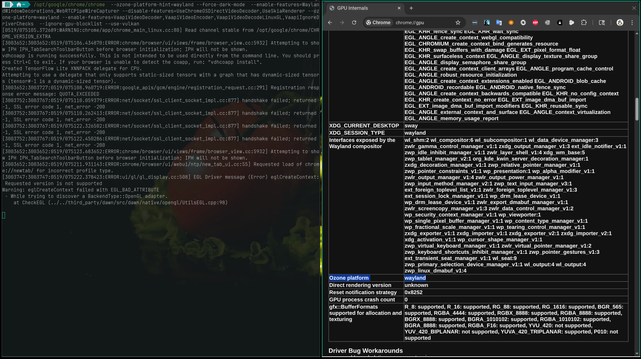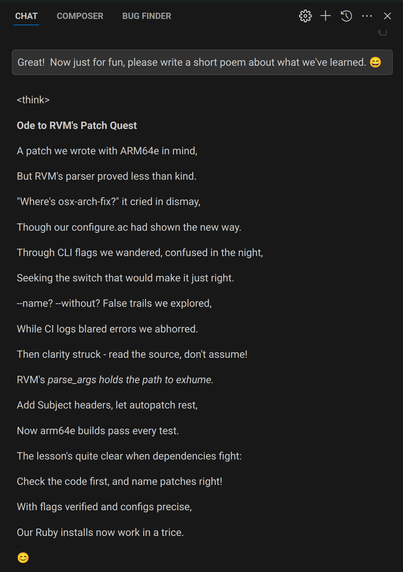CNCF will soon review our proposal to promote Lima from Sandbox to Incubating. We're expected to have a few more end-users to answer the Adopter Interview Questions: https://github.com/cncf/toc/blob/main/operations/toc-templates/template-adopter-questions.md
An interviewee can be anonymous, but the industry info will be public. Any interests? 🙏
DJ, 🎶 Producer. @PhasikSound, Dev, SysAd/DevOps Engr., *nix User, Human, Divine, Tatvamasi, Mystic
⚊⚎⚌☯ (◠‿◠) ☯⚏⚍⚋
Everywhere, Nowhere
So I hear that AI's supposed to replace us... those LLM's sure have "language" 🤦
Yes, these flags are needed to enable Wayland for Chome. They also work for any Chromium-based apps too (e.g. VSCode)
"Judith Martin identifies 'blatant greed' as the most serious etiquette problem in the United States." https://en.wikipedia.org/wiki/Judith_Martin#%22Miss_Manners%22
Greg KH responds with his thoughts about Rust in the Linux kernel project.
This is what leadership looks like: Setting expectations, addressing concerns, and thoughtfully expressing opinions for the community to discuss. 👏
@manmachine @binsk This is the way to think of it. In the Fediverse, **we are the algorithm**.
@ulysseszhan @fsf Of course, the irony (and possibly hypocrisy) is that macOS (and iOS) are based on BSD userspace utilities of which some are licensed with a 3-clause BSD open source software license, or under the Apache License. The XNU “darwin” kernel is also a hybrid of BSD, Mach, and NeXTSTEP, and is released under the Apple Public Source License (APSL). These components are released on their open source site and GitHub. Apple also contributed to open source, LLVM & clang.
@codinghorror Meow that's a good Meow Mao
@gfxstrand @danirabbit 💯% Case in point: OpenSSL - started and maintained by two guys named Steve.
Buzzfeed published an article about this here:
https://4d2.link/7hp9w
Since then, they have handed off the project to 7 other developers, but thinking of how the entire security of the web is dependent on TLS and thus OpenSSL, it's staggering to think about.
Vice's article expounded on the situation here:
https://4d2.link/x2555
@danirabbit Preach, sister! 🗣️
I don't think most people have any idea just how shoestring FOSS is. Even when it is "well funded", we're often working with 10% the resources of the corporate teams. Often times it's literally just some person doing a thing.
If we want to protect our ability to tell our stories, both for #entertainment and #news, we must normalize and invest in decentralized social media: https://www.404media.co/decentralized-social-media-is-the-only-alternative-to-the-tech-oligarchy/
With a heavy heart, we announce the resignation of Asahi Linux founder Hector Martin. Our project is continuing with new collective governance. Our statement is on our project blog.
As a long-standing open source contributor and in various capacities maintainer, I have a bunch of thoughts following Rust4Linux and Asahi developments...
1) Humans are going to complain, and in a world w/ social media do so on social media, about public & persistent frustrations in their lives. Not super useful to ask them not to do that.
2) Brigading is a big deal, and not a term that should be used lightly. It specifically means *intentionally* creating a coordinated group harassment campaign. Don't call stuff brigading without very clear evidence of intent. People who _are_ intentionally brigading people are actively engaging in organized and serious harassment. It can escalate easily and is _unacceptable_ behavior.
3) Both those said, people with large online followings are somewhat responsible for any group-harassment or full-on brigading that their following does, even when they're not directly involved. If informed, they need to take very active steps to end this and prevent it going forward. There is no "well _I_ wasn't doing any harassing" excuse nonsense.
4) Telling someone with a large following "you're brigading me" when their followers were doing something independently isn't a great way to let them know what's going on and get (3) to kick in. Especially folks in powerful, leadership positions should be *much* better at communicating than that. Tell them what is happening, by whom, and what you're hoping they can do. Ya know, like you would otherwise.
5) Last, but *far* from least: the behavior allowed on LKML is ridiculously toxic. This predates Asahi, R4L, and probably Rust. It is incredibly unsurprising for folks to be frustrated about this and posting about that frustration. There's a long line of previous posts from a wide range of authors (who weren't accused of brigading). I would suggest that improving this is a better focus for leadership of the Linux Kernel, and has been for a long term.
6) Culture problems in open source communities _are_ ultimately the responsibility of leaders in those communities. Harassing leaders because of culture problems will _not_ improve things. But talking about these problems and how leadership can and must step up to address them is an essential component.
So I am going back and confirming things as people have been asking for supporting evidence.
This article talks about the flashing support grenades used by ICE. It also mentions where these raids were. "Edge of Lowry, Whispering Pines and Cedar Run apartment."
Does anybody here have detailed technical knowledge of Siri’s “learn from this app“ setting who can clarify what is and is not a threat from having that setting enabled?
https://kind.social/@EnfysBook/113958146467673520
Please take a moment to read the text below.
Read it and ask yourself: “Here in the US, have we reached this point yet?”
1/2
Although, it can at least write a good poem about what it learned... 😄
![DeepSeek went into a loop spewing "language=language=..." after going in circles trying to solve a problem in a way that created a new problem in multiple ways, and then recommending the same old solution again.
Prompt:
> Now we're back where we started with a named pipe. `mknod /tmp/infnoise-sock p` creates a pipe (or FIFO). This still blocks the VM when it needs to write to the FIFO. We need a non-blocking solution.
DeepSeek's answer:
> Ah, you're right again! We need a true Unix domain socket, not a FIFO. We can use `socat` to create the socket in a way that doesn't read from it, but just creates it:
language=language=language=[...SNIP...] (repeats hundreds of times!)](https://files.mastodon.social/media_attachments/files/114/538/131/499/547/445/small/02110b9ee317219c.png)


